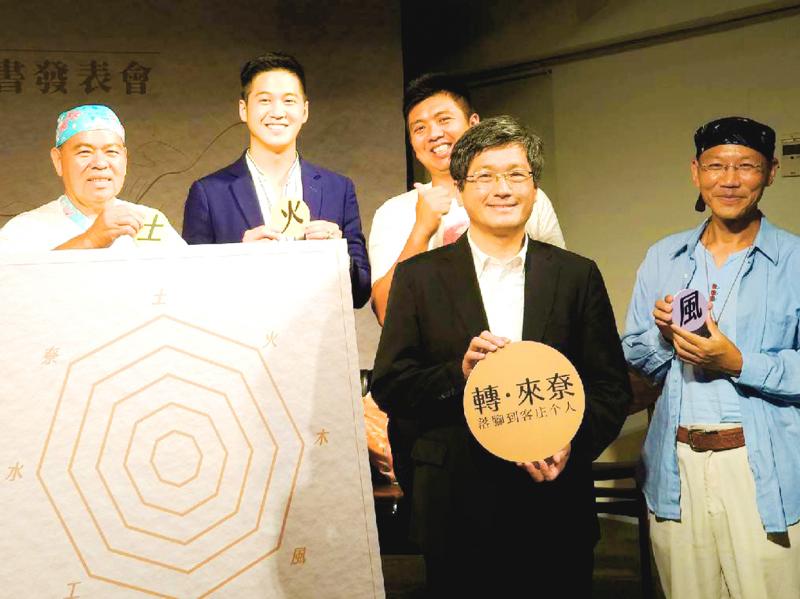The Hakka Affairs Council yesterday released a collection of stories highlighting people who have returned or moved to Hakka communities.
Hakka communities refer to areas that have been listed as “key development areas of Hakka culture” by the council.
Under the Hakka Basic Act (客家基本法), townships, cities and districts in which Hakka make up more than one-third of the total population are listed as “key development areas of Hakka culture” to “enhance the inheritance and development of the Hakka language, culture, and cultural industries.”

Photo: CNA
The new book, titled Zon Loi Liau, expands on a 50-episode television program — Hsing Chuan Wo Chuang (行轉我庄) — the council produced with Formosa TV last year, the council said.
In the program, which can be watched online, people who have settled down in Hakka communities share their stories about living there, their interactions with the land and how they have found themselves, it said.
In the book, the council brings together the stories of 66 entrepreneurs and young people living and working in Hakka communities, the council said, adding that it is available for purchase.
Some of the people are successful businesspeople who have returned to their hometowns to give back to the local community, while others are young farmers incorporating new technology in their practices, it said.
In Hakka, zon (轉) means “return,” council Minister Yiong Con-ziin (楊長鎮), who wrote the foreword for the book, said at the launch of the book in Taipei.
To return also implies a fulfillment of one’s nostalgia for the land, he said.
Yiong, a Hakka born in Miaoli County, said that he admires and envies people who return to live in Hakka communities.
The council has released a booklet along with the book containing text written by Hakka author Kao Yi-feng (高翊峰) for the television program last year.
Kao’s text was used to introduce each episode in the series.
Additional reporting by CNA

ALIGNED THINKING: Taiwan and Japan have a mutual interest in trade, culture and engineering, and can work together for stability, Cho Jung-tai said Taiwan and Japan are two like-minded countries willing to work together to form a “safety barrier” in the Indo-Pacific region, Premier Cho Jung-tai (卓榮泰) yesterday said at the opening ceremony of the 35th Taiwan-Japan Modern Engineering and Technology Symposium in Taipei. Taiwan and Japan are close geographically and closer emotionally, he added. Citing the overflowing of a barrier lake in the Mataian River (馬太鞍溪) in September, Cho said the submersible water level sensors given by Japan during the disaster helped Taiwan monitor the lake’s water levels more accurately. Japan also provided a lot of vaccines early in the outbreak of the COVID-19 pandemic,

Kaohsiung Mayor Chen Chi-mai (陳其邁) on Monday announced light shows and themed traffic lights to welcome fans of South Korean pop group Twice to the port city. The group is to play Kaohsiung on Saturday as part of its “This Is For” world tour. It would be the group’s first performance in Taiwan since its debut 10 years ago. The all-female group consists of five South Koreans, three Japanese and Tainan’s Chou Tzu-yu (周子瑜), the first Taiwan-born and raised member of a South Korean girl group. To promote the group’s arrival, the city has been holding a series of events, including a pop-up

TEMPORAL/SPIRITUAL: Beijing’s claim that the next Buddhist leader must come from China is a heavy-handed political maneuver that will fall flat-faced, experts said China’s requirement that the Dalai Lama’s reincarnation to be born in China and approved by Beijing has drawn criticism, with experts at a forum in Taipei yesterday saying that if Beijing were to put forth its own Dalai Lama, the person would not be recognized by the Tibetan Buddhist community. The experts made a remarks at the two-day forum hosted by the Tibet Religious Foundation of His Holiness the Dalai Lama titled: “The Snow Land Forum: Finding Common Ground on Tibet.” China says it has the right to determine the Dalai Lama’s reincarnation, as it claims sovereignty over Tibet since ancient times,

Temperatures in some parts of Taiwan are expected to fall sharply to lows of 15°C later this week as seasonal northeasterly winds strengthen, the Central Weather Administration (CWA) said today. It is to be the strongest cold wave to affect northern Taiwan this autumn, while Chiayi County in the southwest and some parts of central Taiwan are likely to also see lower temperatures due to radiational cooling, which occurs under conditions of clear skies, light winds and dry weather, the CWA said. Across Taiwan, temperatures are to fall gradually this week, dropping to 15°C to 16°C in the early hours of Wednesday